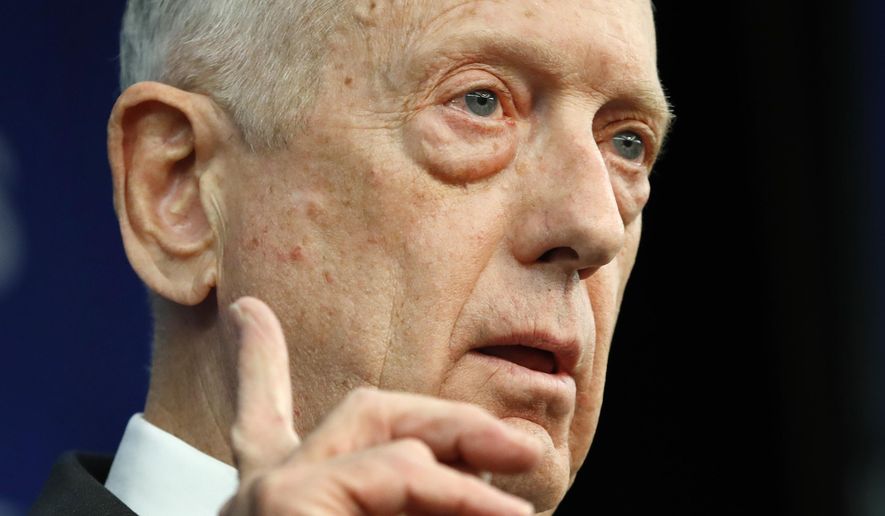Defense Secretary James N. Mattis made a forceful call for all parties involved in the brutal war in Yemen to come to the negotiation table within the next month, to bring to an end to a conflict pushed by a Saudi Arabian-led coalition that has devolved into a military stalemate that has produced one of the world’s worst humanitarian crises.
In remarks to the Washington-based U.S. Institute for Peace, the Pentagon chief said that it was long past time for the Arab coalition, led by Saudi Arabia and the United Arab Emirates, battling Iranian-backed Houthi separatists in Yemen to lay down their arms.
Both the Obama and Trump administrations have provided intelligence and logistics support to the Saudi coalition, despite fierce and growing criticism on Capitol Hill. The war is widely as a personal project of hard-charging Saudi Crown Prince Mohammed bin Salman, who has cultivated close ties with the Trump White House.
Mr. Mattis’ remarks represented a notable increase in Washington’s unhappiness with the course of the war.
“This has got to end. We have to replace combat with compromise” in Yemen, the Pentagon chief said, demanding all parties to begin negotiations on a peace pact by next month.
“We want to see everybody around a peace table based on a cease-fire, based on a pullback from the border, and then based on ceasing dropping of bombs,” Mr. Mattis said. “You can’t say we’re going to do it sometime in the future.”
But Mr. Mattis’ criticisms came just as the Agence France-Presse news agency war was reporting the Saudi-led coalition was dispatching an additional 10,000 troops to the fight, in support of a new offensive against the Houthis. The new troops will be arriving “within days,” officials told the AFP.
The Saudi coalition is fighting alongside the government of Yemeni President Abedrabbo Mansour Hadi, ousted from the capital Sanaa and much of the country by Houthi forces in 2015.
Negotiators led by U.N. Special Envoy to Yemen Martin Griffiths are slated to begin talks on a peace deal in Sweden next month.
On Tuesday, Mr. Mattis said Riyadh and Abu Dhabi are now willing to entertain the idea of U.N.-led peace talks to end the three-year conflict. He said the issue was “brought up forcefully” at a recent regional security summit with Arab allies in Manama, Bahrain.
While both the Obama and Trump administrations have decried Iran’s links — and apparent military support — for the Houthis, Riyadh’s heavy-handed strategy to defeat the Houthis, which has reportedly included the use of cluster bombs banned under the international rules of war, has reportedly killed thousands of civilians and brought condemnation from the international community.
The conflict has only escalated in recent days, as Saudi and Emirati forces tried and failed to deliver a decisive blow to the Houthis in June. A coalition campaign to seize the critical port city of Hodeidah has bogged down, amid fresh reports of heavy collateral damage to Yemeni civilians.
U.S. forces in the region reportedly continue to provide Arab coalition forces in Yemen intelligence and logistical support, and have done so throughout the course of the war. American combat aircraft only refuel roughly “less than 20 percent” of all Saudi-flagged jet fighters and bombers conducting airstrikes in Yemen, Mr. Mattis said.
There has been open speculation that blowback from the apparent government-ordered killing of dissident Saudi journalist Jamal Khashoggi earlier this month in Turkey has greatly weakened the crown prince’s leverage and could lead U.S. officials to take a harder line on the expensive and destructive war in Yemen.
“We have the opportunity … to sit down with [Crown Prince Mohammed] and say, ‘We cannot go on like this,’” former U.S. Assistant Secretary of State for Near Eastern Affairs Martin Indyk said last week, adding that conversation had to begin with ending the Yemeni war.
But Mr. Mattis on Tuesday said the Khashoggi affair was not the impetus behind his comments, calling them two separate issues.
“I would separate [the Khashoggi killing] out from the Yemen situation,” Mr. Mattis said at the United States Institute of Peace. “That stands unique, by itself. The president said we want to get to the bottom of it. We will get to the bottom of it.”
• Carlo Muñoz can be reached at cmunoz@washingtontimes.com.




Please read our comment policy before commenting.